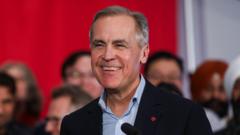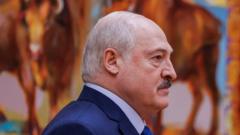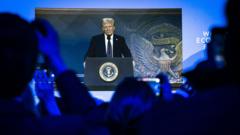Mark Carney, the frontrunner to lead Canada, has outlined his strategy against recent U.S. tariffs, which have sparked a stark political and economic standoff.
Canada's Potential Response to Trump's Tariffs: A Stand Against Bullying

Canada's Potential Response to Trump's Tariffs: A Stand Against Bullying
Mark Carney, a leading candidate for the Canadian prime ministership, vows a strong retaliation against U.S. tariffs.
In an exclusive interview with BBC Newsnight, Mark Carney, former governor of both the Bank of Canada and the Bank of England and current leading contender for the Canadian Liberal Party leadership, addressed U.S. President Donald Trump's announcement of 25% tariffs on Canadian goods. Carney firmly stated that Canada "will stand up to a bully," expressing determination that the nation will match the tariffs dollar for dollar.
Carney is among five candidates vying to succeed Justin Trudeau, who announced his resignation in January after nearly a decade of leadership. According to recent polls, the Liberal Party currently trails behind the Conservatives, with their leadership race concluding on March 9. His assertive stance against the tariffs suggests a possible shift in Canada's trade policy should he come to power.
"President Trump probably thinks Canada will cave in. But we are going to stand up to a bully, we're not going to back down," Carney declared, emphasizing Canada's commitment to unity and retaliatory measures. He criticized the tariffs as harmful not only to Canada but also to the U.S. reputation internationally, arguing that they would stifle growth and potentially raise inflation and interest rates.
The tariffs—a continuation of Trump's aggressive economic policies—could significantly impact the Canadian economy, economists warn. The immediate fallout for Canada could lead to increased prices for consumers in the U.S. The strategic use of tariffs has been a critical aspect of Trump’s economic vision, aimed at safeguarding American jobs and garnering tax revenue.
Outgoing Prime Minister Trudeau has indicated that Canada’s response to these tariffs will be both "forceful" and "immediate." As part of the escalating trade tensions, Trump has also revealed plans to impose additional tariffs on the European Union, condemning the bloc's treatment of the U.S.
Overall, the unfolding tariff situation places Carney in a key position as he seeks to position Canada firmly against external economic pressures while enhancing his political appeal ahead of critical leadership elections.
Carney is among five candidates vying to succeed Justin Trudeau, who announced his resignation in January after nearly a decade of leadership. According to recent polls, the Liberal Party currently trails behind the Conservatives, with their leadership race concluding on March 9. His assertive stance against the tariffs suggests a possible shift in Canada's trade policy should he come to power.
"President Trump probably thinks Canada will cave in. But we are going to stand up to a bully, we're not going to back down," Carney declared, emphasizing Canada's commitment to unity and retaliatory measures. He criticized the tariffs as harmful not only to Canada but also to the U.S. reputation internationally, arguing that they would stifle growth and potentially raise inflation and interest rates.
The tariffs—a continuation of Trump's aggressive economic policies—could significantly impact the Canadian economy, economists warn. The immediate fallout for Canada could lead to increased prices for consumers in the U.S. The strategic use of tariffs has been a critical aspect of Trump’s economic vision, aimed at safeguarding American jobs and garnering tax revenue.
Outgoing Prime Minister Trudeau has indicated that Canada’s response to these tariffs will be both "forceful" and "immediate." As part of the escalating trade tensions, Trump has also revealed plans to impose additional tariffs on the European Union, condemning the bloc's treatment of the U.S.
Overall, the unfolding tariff situation places Carney in a key position as he seeks to position Canada firmly against external economic pressures while enhancing his political appeal ahead of critical leadership elections.























